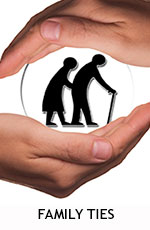Most people who say ‘Yes’ to caring for someone they love begin with a set of assumptions. And those assumptions can harm us over time.
Here’s why.
Bad assumption: My role is to give care.
 Why do we believe that caregivers only give care? Of course, there is one person in a care relationship who will need assistance with particular activities of daily living. But that doesn’t mean that a loved one never gives care in return.
Why do we believe that caregivers only give care? Of course, there is one person in a care relationship who will need assistance with particular activities of daily living. But that doesn’t mean that a loved one never gives care in return.
A frail senior can pat an adult child’s hand or offer words of wisdom. Sometimes, care comes in more ephemeral ways such as a smile or even an hour of peaceful silence. Friends or extended family members might offer to fill a shift or cook a meal. Caregivers are care receivers, too.
Think instead: My role is to both give and receive care.
Bad assumption: I will be happy only if others show me I’m loved.
This belief is very harmful to caregivers because frequently our loved ones can’t offer positive reinforcement for our private caring acts. And why should they? The purpose of care is to enable a loved one to be healthy and do whatever he or she would like to do.
Caregiving is by nature very personal, so public recognition is not a perk of the job. Happiness and fulfilment are emotions that must be generated by the caregiver from within.
Think instead: I can be happy and fulfilled if I choose to be.
Bad assumption: If I don’t do everything myself, I’m a failure.
This is perhaps the most damaging belief for caregivers and care receivers alike. If Steve Jobs believed he could create a computer company with no employees, Apple would not exist today. Care, like all complex tasks, is best delivered as a team.
This doesn’t mean that you need lots of paid help or legions of friends to deliver meals. It means that people need to support you, the caregiver, to thrive in your role. That support will look different for every caregiver, but the constant is that there’s a team and the caregiver is the team leader.
Think instead: I give the best care if I work as a team leader.
Bad assumption: I must appear calm and in control at all times.
Caregiving is emotional. There are highs and lows, as well as long stretches of quiet repetition.
Many caregivers feel that it’s wrong to express frustration or grief – that a show of emotion to medical professionals is unprofessional or, worse, a betrayal of their loved one.
Some caregivers worry that tears will elicit an unwanted pity response in friends or that if they begin to cry, they might not be able to stop.
Caregivers need to express emotions, including painful ones.
Think instead: I pay attention to my emotions and sometimes, I feel better after a good cry.
Bad assumption: Work at home is not as important as work for pay.
Wrong! Work at home is vital and it has great worth. In Canada, family caregivers contribute over $5 billion in unpaid labour annually to the national health-care system.
The next time someone asks “So, do you work?” answer “Oh yes! I work as my mother’s caregiver. And what do you do?”
Think instead: My work giving care is valuable and important.
© Troy Media
The views, opinions and positions expressed by columnists and contributors are the author’s alone. They do not inherently or expressly reflect the views, opinions and/or positions of our publication.

